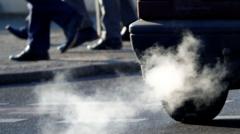Can the Welsh Government Take Action to Improve Air Quality?

Improving Air Quality in Wales: A Call for More Ambitious Targets
Air quality is a pressing concern in many regions around the world, and Wales is no exception. Recent reports have raised alarms about the quality of air that children in Wales breathe, particularly around schools. Campaigners argue that the Welsh government must set more ambitious targets to combat air pollution effectively. This article delves into the current state of air quality in Wales, the implications for children's health, and the necessary steps the government and communities can take to foster a healthier environment.
The Current State of Air Quality in Wales
Research conducted by Friends of the Earth Cymru has revealed that over 200 schools in Wales are located in areas where air pollutants exceed the World Health Organization (WHO) guidelines. This alarming statistic highlights a significant public health issue, especially considering that two-thirds of these schools are situated in Cardiff, the capital city of Wales. The presence of harmful pollutants such as nitrogen dioxide (NO2) and particulate matter (PM2.5) poses a serious risk to the health of children, many of whom are already vulnerable due to underlying respiratory conditions.
The Impact of Air Pollution on Children
Children are particularly susceptible to air pollution due to their developing bodies and respiratory systems. Campaigners like Ada, an 11-year-old member of an eco-committee at Roath Park Primary School, voice their concerns about how air pollution can exacerbate health issues such as asthma. Statistics from Healthy Air Cymru suggest that air pollution is intricately linked to a growing prevalence of asthma in children across Wales.
- Air pollution can lead to increased hospital admissions for asthma-related issues.
- Children exposed to poor air quality may experience long-term health consequences, including impaired lung development.
- Studies indicate that air pollution contributes to other serious health conditions, such as heart disease, dementia, and even some cancers.
Parents and educators are taking steps to mitigate these risks. For instance, Fatima, also 11, actively encourages her family and peers to adopt more sustainable travel methods, such as walking to school instead of driving. These grassroots efforts are essential, but they must be complemented by robust governmental action and policy reform.
The Role of the Welsh Government
In light of these concerns, the Welsh government has acknowledged the need for improved air quality management. The government has recently passed legislation aimed at cleaning up the air in Wales. However, environmental advocates argue that this is merely the beginning of a much larger process. Haf Elgar, the director of Friends of the Earth Cymru, emphasizes the necessity for the government to set clear legislative targets for air quality improvement. She believes that ambitious goals will drive action across all levels of government and society.
Current Initiatives and Funding
The Welsh government is already taking steps to address air quality issues by providing funding to local authorities through its Local Air Quality Management Support Fund. For the current year, the fund allocates £1 million to support various initiatives aimed at improving air quality, including educational programs in schools. The emphasis on raising awareness among children and young people is crucial, as education plays a key role in fostering long-term changes in behavior and community engagement.
Monitoring Air Quality: A Complex Landscape
Despite these initiatives, there are varying opinions regarding the state of air quality. Cardiff Council asserts that all monitored locations in the city meet existing legal air quality objectives, and many schools reported significantly lower pollutant levels than those indicated by Friends of the Earth Cymru's research. This discrepancy raises questions about the accuracy and comprehensiveness of air quality monitoring and reporting practices in Wales.
The Importance of Accurate Data
Accurate data is essential for effective policy development and public health initiatives. Joseph Carter from Healthy Air Cymru highlights the need for continuous monitoring and transparent reporting to ensure that communities are informed and engaged in efforts to improve air quality. Furthermore, the Royal College of Physicians (RCP) has called for urgent action, stating that there is “no safe level” of air pollution, emphasizing the need for immediate and sustained intervention.
Community Involvement: A Collective Responsibility
Environmental change is not solely the responsibility of government entities; it requires active participation from individuals and communities. Schools like Roath Park Primary are leading by example, with eco-committees engaging students in proactive measures to improve local air quality. Activities such as planting trees and promoting walking or cycling to school are vital steps that can have a positive impact on air quality and health.
Encouraging Sustainable Practices
To foster a culture of environmental responsibility, schools and communities can implement several strategies:
- Education: Incorporate environmental education into the curriculum to raise awareness about air quality and its health impacts.
- Community Initiatives: Organize community clean-up events and tree-planting days to enhance local green spaces.
- Transport Solutions: Promote carpooling, walking buses, and cycling routes to reduce vehicle emissions around schools.
These initiatives not only improve air quality but also foster a sense of community and shared responsibility for health and well-being.
Legislative Recommendations for Improved Air Quality
To make significant progress in combating air pollution, the Welsh government should consider implementing the following legislative measures:
- Set Clear Targets: Establish specific, measurable targets for reducing air pollution levels in line with WHO guidelines.
- Regular Monitoring: Mandate regular air quality assessments in schools and high-traffic areas to ensure compliance with established standards.
- Incentivize Clean Transport: Provide financial incentives for electric vehicles and public transportation to encourage a shift away from fossil fuel reliance.
- Public Awareness Campaigns: Launch comprehensive campaigns to educate the public on the importance of air quality and actions they can take to improve it.
By adopting these measures, the Welsh government can demonstrate its commitment to safeguarding public health and enhancing the quality of life for all citizens.
Conclusion: A Call to Action
The challenges posed by air quality in Wales are significant but not insurmountable. With concerted efforts from government, schools, and communities, it is possible to create a healthier environment for future generations. As campaigners and health experts continue to advocate for improved air quality measures, it is imperative that individuals also take initiative in their daily lives. Together, we can work towards a cleaner, healthier Wales.
How can you contribute to improving air quality in your community? Whether it's advocating for better policies or making small changes in your daily routine, every action counts. Let's prioritize clean air for our children and for ourselves. #AirQuality #Wales #CleanAir
FAQs
What are the main pollutants affecting air quality in Wales?
The primary pollutants affecting air quality in Wales include nitrogen dioxide (NO2) and particulate matter (PM2.5). These pollutants are often linked to traffic emissions and industrial activity.
How does air pollution impact children's health?
Air pollution can exacerbate respiratory conditions like asthma and may lead to long-term health issues, including impaired lung development and increased risk of chronic diseases.
What steps can individuals take to reduce air pollution?
Individuals can reduce air pollution by using public transport, walking or cycling, carpooling, supporting local clean air initiatives, and advocating for policy changes aimed at improving air quality.
Published: 2025-06-18 22:06:03 | Category: wales



